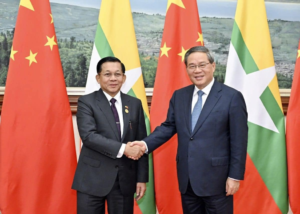Myanmar Spring Chronicle – November 7:
What Benefits Will the Military Leader’s Trip to China Yield? India’s Approach to Resolving Myanmar’s Political Crisis
(November 8, 2024 – MoeMaKa)
During a five-day visit to Yunnan Province in China, Myanmar’s military leader Min Aung Hlaing participated in the Greater Mekong Region meeting and additional separate meetings with regional nations like ASEAN and China. This trip provided an opportunity for diplomatic gains for Myanmar’s military-led government, allowing them to engage in international affairs more visibly. China’s primary intent behind this invitation seemed to be to influence Myanmar’s military to cease internal armed conflicts, pushing for peace negotiations and a ceasefire to stabilize the region. China’s interest lies in ensuring a more favorable environment for its projects in the area if armed conflicts lessen. This appears to be the reason for China’s invitation to the regional summit.
In terms of diplomatic protocol, the Chinese Prime Minister Mr. Li Qiang met with Myanmar’s military leader, signaling high-level interaction. However, the highest authority, President Xi Jinping, did not attend this meeting, nor did he meet with Myanmar’s military leader. The encounter with the Chinese Prime Minister marks the first high-level interaction for Myanmar’s military leader since the coup.
At a time when Min Aung Hlaing’s forces are losing territory to various ethnic armed groups and northern allies, they may find China’s offer hard to refuse. Meanwhile, China is reminding the military of its stance on a stable Myanmar but remains non-committal on democratic or federal solutions, focusing instead on maintaining Myanmar’s sovereignty without Western influence.
In addition, Myanmar’s military leader met with the Prime Ministers of Thailand, Laos, and Cambodia during this trip, adding further diplomatic benefits. Although the military already has strong ties with Thailand’s military, this provided a rare opportunity to discuss cross-border trade and security with Thailand’s civilian leadership, an arrangement beneficial to the military government.
Simultaneously, as China applies pressure on Myanmar’s military to take its preferred approach, India has taken its own path. India invited 11 political parties and Myanmar’s Peace Committee members to discuss federalism and democratic governance within the framework of India’s Constitution. This invitation by ICWA, an Indian government think tank, underscores India’s focus on fostering a peaceful resolution to Myanmar’s internal conflicts. Unlike China, India is not deeply involved in Myanmar’s internal conflicts but is concerned with border security, keeping an eye on armed groups near their borders, and ensuring stability in the region.

